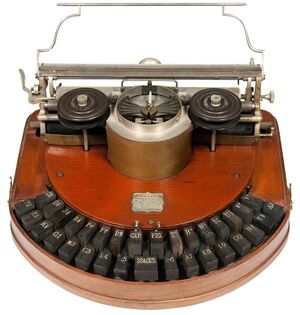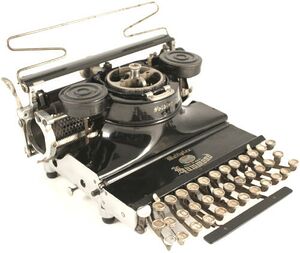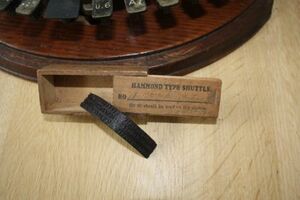Difference between revisions of "Hammond Typewriter"
| (5 intermediate revisions by 2 users not shown) | |||
| Line 1: | Line 1: | ||
| + | [[Category:Typewriter]] | ||
__TOC__ | __TOC__ | ||
[[File:Hammond1ideal.jpg|thumb|A Hammond 1 with a 2 bank Ideal keyboard]] | [[File:Hammond1ideal.jpg|thumb|A Hammond 1 with a 2 bank Ideal keyboard]] | ||
| Line 4: | Line 5: | ||
=History and Basic Info= | =History and Basic Info= | ||
| − | The Hammond Typewriter was first invented in | + | The Hammond Typewriter was first invented by U.S. journalist, inventor, and philanthropist James Bartlett Hammond in 1880. Featuring a very unique mechanism that uses interchangeable type shuttles to print on the page, the Hammond's alignment and ability to swap typestyles brought it modest success that continued throughout the 1900s with minimal changes. Mechanically, paper is inserted into the middle of the carriage, and is drawn up to be typed on. This machine has no platen, but uses a "hammer" on the back to imprint the paper into the ribbon and type shuttle to print a character. |
| − | + | ||
| + | Hammond Typewriters were designed to easily print even type. While many early typewriters often fell out of alignment, the single typeshuttle of the Hammond ensured that characters were always in good proportion to each other. | ||
| + | |||
| + | Later in the company's history, Hammond began to manufacture the Multiplex, which is one of the most common Hammonds. These often also have folding keyboards. There is even a special math keyboard version that uses special shuttles and has 2 extra shift buttons. | ||
| + | |||
| + | In 1926, Hammond would become Vari-Typer co, manufacturing electrified Multiplexes with metal shuttles and various small updates. The unique capabilities and role of the Varityper -- descended from the Hammond it succeeded -- gave it a niche in the market until the [IBM Selectric] entered the scene. | ||
| + | Varityper still exists, as a division of AM (Addressograph-Multigraph) International, producing printers. | ||
| + | |||
[[File:Type shuttle and box.jpg|thumb|A Hammond Type shuttle and it's box]] | [[File:Type shuttle and box.jpg|thumb|A Hammond Type shuttle and it's box]] | ||
| − | |||
=Common Issues= | =Common Issues= | ||
The mechanism of the Hammond typewriter requires a very tight mainspring, so these are often found with broken drawbands. Because they are old, expect a lot of dust. The Hammond type shuttles were made of hardened rubber, so watch out for broken shuttles and take much care to prevent them from breaking. | The mechanism of the Hammond typewriter requires a very tight mainspring, so these are often found with broken drawbands. Because they are old, expect a lot of dust. The Hammond type shuttles were made of hardened rubber, so watch out for broken shuttles and take much care to prevent them from breaking. | ||
| + | |||
| + | =Usage and Maintainence= | ||
| + | Use an impression strip or backing sheet to prevent shuttle damage. | ||
| + | Do not oil shuttles at all. Vulcanized rubber decays under organic solvents. | ||
=Manual= | =Manual= | ||
Latest revision as of 17:58, 21 October 2021
History and Basic Info
The Hammond Typewriter was first invented by U.S. journalist, inventor, and philanthropist James Bartlett Hammond in 1880. Featuring a very unique mechanism that uses interchangeable type shuttles to print on the page, the Hammond's alignment and ability to swap typestyles brought it modest success that continued throughout the 1900s with minimal changes. Mechanically, paper is inserted into the middle of the carriage, and is drawn up to be typed on. This machine has no platen, but uses a "hammer" on the back to imprint the paper into the ribbon and type shuttle to print a character.
Hammond Typewriters were designed to easily print even type. While many early typewriters often fell out of alignment, the single typeshuttle of the Hammond ensured that characters were always in good proportion to each other.
Later in the company's history, Hammond began to manufacture the Multiplex, which is one of the most common Hammonds. These often also have folding keyboards. There is even a special math keyboard version that uses special shuttles and has 2 extra shift buttons.
In 1926, Hammond would become Vari-Typer co, manufacturing electrified Multiplexes with metal shuttles and various small updates. The unique capabilities and role of the Varityper -- descended from the Hammond it succeeded -- gave it a niche in the market until the [IBM Selectric] entered the scene. Varityper still exists, as a division of AM (Addressograph-Multigraph) International, producing printers.
Common Issues
The mechanism of the Hammond typewriter requires a very tight mainspring, so these are often found with broken drawbands. Because they are old, expect a lot of dust. The Hammond type shuttles were made of hardened rubber, so watch out for broken shuttles and take much care to prevent them from breaking.
Usage and Maintainence
Use an impression strip or backing sheet to prevent shuttle damage. Do not oil shuttles at all. Vulcanized rubber decays under organic solvents.


